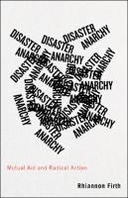Explore

Anarchists have been central in helping communities ravaged by disasters, stepping in when governments wash their hands of the victims. Looking at Hurricane Sandy, Covid-19, and the social movements that mobilised relief in their wake, Disaster Anarchy is an inspiring and alarming book about collective solidarity in an increasingly dangerous world.
As climate change and neoliberalism converge, mutual aid networks, grassroots direct action, occupations and brigades have sprung up in response to this crisis with considerable success. Occupy Sandy was widely acknowledged to have organised relief more effectively than federal agencies or NGOs, and following Covid-19 the term 'mutual aid' entered common parlance.
However, anarchist-inspired relief has not gone unnoticed by government agencies. Their responses include surveillance, co-option, extending at times to violent repression involving police brutality. Arguing that disaster anarchy is one of the most important political phenomena to emerge in the twenty-first century, Rhiannon Firth shows through her research on and within these movements that anarchist theory and practice is needed to protect ourselves from the disasters of our unequal and destructive economic system.
This book is included in DOAB.
Why read this book? Have your say.
You must be logged in to comment.
Rights Information
Are you the author or publisher of this work? If so, you can claim it as yours by registering as an Unglue.it rights holder.Downloads
This work has been downloaded 91 times via unglue.it ebook links.
- 91 - pdf (CC BY-NC-ND) at OAPEN Library.
Keywords
- Natural disasters
- Political activism
- Politics & government
- Social impact of disasters
- Social issues & processes
- Social services & welfare, criminology
- Social welfare & social services
- Society & culture: general
- Society & Social Sciences
- The environment
- thema EDItEUR::J Society and Social Sciences::JB Society and culture: general::JBF Social and ethical issues::JBFF Social impact of disasters / accidents (natural or man-made)
- thema EDItEUR::J Society and Social Sciences::JK Social services and welfare, criminology::JKS Social welfare and social services
- thema EDItEUR::J Society and Social Sciences::JP Politics and government::JPW Political activism / Political engagement
Editions

